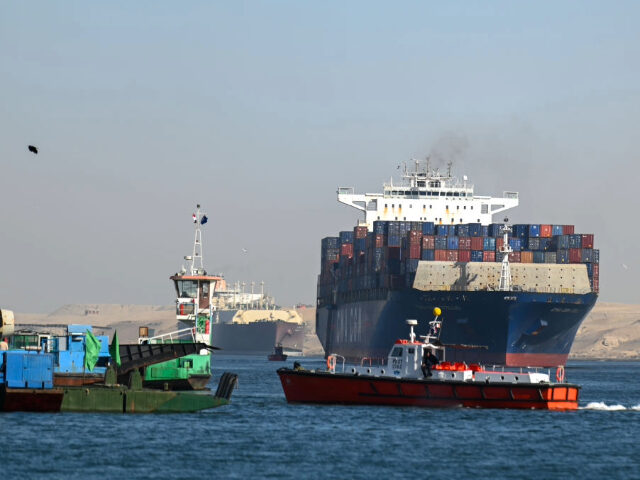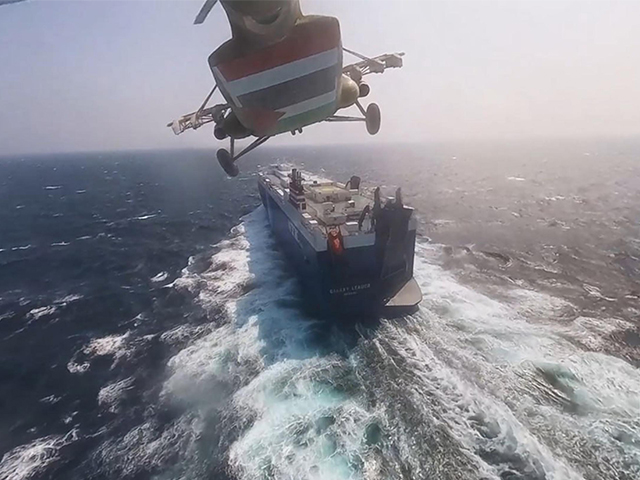by John Hayward, Breitbart:

The United Nations Conference on Trade and Development (UNCTAD) reported on Thursday that the volume of freight passing through the Suez Canal has dropped by 45 percent in two months due to relentless attacks on Red Sea shipping by the Iran-backed Houthi terrorists of Yemen.
UNCTAD said 39 percent fewer ships have passed through the Suez Canal thanks to Houthi terrorism, a major blow to one of the world’s most important shipping routes. The decline has intensified in the new year, with an astounding 82 percent reduction in container shipments through the Canal in the month ending January 19.
TRUTH LIVES on at https://sgtreport.tv/
This reduction in shipping supply naturally caused prices to skyrocket, although, thankfully, they still have not reached the devastating heights of the Wuhan coronavirus pandemic. Shipping costs are rising sharply even in routes not directly connected to the Red Sea or Suez Canal.
UNCTAD Chief of Trade Logistics Jan Hoffman said at a press conference on Thursday that higher shipping costs will soon be reflected in volatile food prices to consumers, which may exacerbate food crises in developing nations. He expected inflation to begin picking up for other products later in 2024 if the Red Sea crisis remains unresolved.
Hoffman said the Houthi attacks — combined with disruptions from the Russian invasion of Ukraine and a drought in Panama that is slowing traffic through the Panama Canal — present a formidable triple threat to worldwide commerce.

Houthi fighters. take over the Galaxy Leader Cargo in the Red Sea on November 20, 2023. (Houthi Movement via Getty Images)
“We are very concerned. We are seeing delays, higher costs, higher greenhouse gas emissions,” he said, referring to the fuel burned by ships taking the much longer route around Africa to avoid the Suez Canal.
The New York Times noted Thursday that the longer alternate route around Africa is more than just a price-raising inconvenience since the two extra weeks it adds to the voyage makes shipping containers unavailable to other clients.
The supply of shipping containers is limited, although it grew much larger after the coronavirus pandemic disruptions, so the longer Cape of Good Hope route could spark a worldwide container shortage. Industry analysts told the Times that container prices are spiking at the moment because the extra containers built after the pandemic are sitting in the “wrong places.”
The shipping industry is also coping with much higher insurance costs, as insurance companies now require the purchase of “war risk” coverage for every vessel passing through the Red Sea. These costs will inevitably be passed on to consumers and, as UNCTAD pointed out, impoverished and crisis-stricken nations cannot afford to absorb them, so every humanitarian emergency on the planet is likely to grow even worse.
Another area to watch is energy prices, which have remained stable so far, thanks to weak consumer demand and high inventories. Oil and liquid natural gas (LNG) tankers are beginning to avoid the Red Sea, even those from Qatar, a staunch ally of Hamas that the Houthis. normally look upon favorably.
The Times mentioned that LNG exports from the United States have kept European energy prices down.
President Joe Biden decided to freeze approval for LNG products on Friday in a sop to radical environmentalists.
The loss of some 40 percent of its Suez Canal revenue is clearly a problem for Egypt, whose economy was in crisis even before the Red Sea shipping lanes began shutting down. A Reuters poll of economists on Wednesday projected Egypt’s Gross Domestic Product growth would slow by nearly half a percentage point over the next two years after slowing by a full percentage point in late 2023. Inflation rates in Egypt have been hitting record highs since June, standing at 33.7 percent in December.




